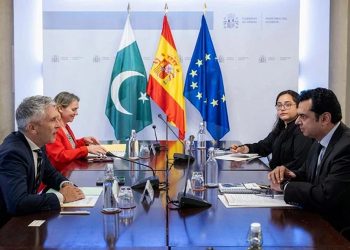Imran Khan-led federal government has faced the opposition onslaught with considerable courage and determination, but now that the fray for electioneering will start from next year, it must prepare itself for the daunting task much more seriously than seen till now. It must set its goals well in advance, squeezing time of weeks or days to hours, for every minute will count in the battle for survival.
It has to do some soul searching as to where it failed, plug those holes, and launch on a plan, where programme and planning uplifted into reality with timely execution. It has done not too bad so far, but not too good either. First, it must form a full-fledged, Planning Commission, completely independent and autonomous in its working, and secondly, allow Pakistanis at home to deposit their savings in local currency to Roshan Digital accounts, which the Banks have been operating, but to draw maximum mileage from it, mere transmission of foreign currencies from overseas Pakistanis, would never be ideal.
Thousands of families, getting money from their loved ones, living abroad, are unable to have their accounts because of stringent State Bank steps of biometric system. Some of the families received cheques after winning court battles in Pakistani rupee, but these cheques, bearing State Bank stamp, cannot be cashed. Neither could it be converted into foreign currencies because of ban from the central bank to buy dollars from the market and deposit in foreign currency market. These cheques, awarded to them by courts after protracted litigation, running into lakhs of rupees, mean a lot to middle and lower-class families, but are totally useless. These would expire in six months’ time, and would nothing but waste papers.
If only an amendment is made into the currency laws, these cheques can easily be deposited in the name of persons issued, who can endorse it to it nominees, so that those looking helpless now, can draw the welfare plans on the sum total, like children’s education, renovation of houses, or paying debts.
Lessons should be drawn from Ayub Khan, who despite being a military dictator, had taken the country to pinnacle of glory where industrial progress, commerce and trade, had earned Pakistan a name in the region. He had set up a planning commission under Saeed Ahmad, with Sartaj Aziz, and Jameel Nishtar as members.
Its job was to prepare 5-year development plans, 10-year and 20-year perspective planning for the government to frame its annual budget. Pakistani plan of economic development was cited as role model for many a country.
A country on the threshold of youthful years (1947 to 1960—just 1 years too short a period for any nation or country), was far, far ahead of India, and even served as land route for landlocked Nepal and Afghan Transit Trade, so much so that even a country like South Korea borrowed the development strategy from financial wizard Dr Mahboobul Haq, and helped soar it’s economy sky-high while Pakistan under Zulfikar Ali Bhutto abandoned the Planning Commission. Since then a planning minister is looking after a task, which is beyond the capability of any individual, howsoever clever or intelligent his capacity to conceive a well-thought-out programme for long term planning, would always be in question.
Whatever Bhutto’s weaknesses, his role in 1971 crisis has been debated for long. No point recalling it here, for, it would serve no purpose. But Bhutto should also be remembered for his hard work, working for 15 to 16 hours a day and tasking his ministers to produce results or go home. The country got the Steel Mill from Russia, and the Karachi Nuclear Power Plant remains a towering monument as his brain-child.
Imran too, instead of forming commissions and committees, must believe in action, prompt execution of plans, without delay, show to the world and his own countrymen that he means business. Mere promises would just not do
Imran is not lacking in determination, but his dream of turning Pakistan into a welfare State, can only be realized through deeds, rather than words. Time being of essence, though old adage, remains relevant even today. It should be the main motto and guiding principle for him.
Success comes the hard way. Opposition, whether the combination of 11-party alliance called Pakistan Democratic Movement, cannot do him much harm, but procrastination can be killing. Bhutto failed because of his feudal mindset, his left-leaning training from California’s Berkley University, drove him to nationalize industries, banks, insurance companies, which damaged the country more than anything else, even a war with military hardware. Pakistan’s economy halted when it genuinely needed government patronage.
Imran, as the country’s chief executive, has to scan through the pages of history. He is well educated, well versed with history. The only thing he needs to concentrate on is execution, for a work half-done leads to success, so says the maxim, which is still too good to do away with.
Much bigger challenges than those facing on the domestic front, are in economic and foreign affairs fields. Imran Khan as prime minister is luckily known world over, both as renowned sportsman, and as outstanding spokesman not only, for his own people, but also for those confronted with problems around the world.
A person of celebrity status, he has stoutly resisted Western pressure to recognize Israel, so much so that a brotherly country like Saudi Arabia was checked, and Tel Aviv’s plan to make inroads into Islamic bloc had could not enlarge beyond a micro-level redemption. Just two of the 54 or 57 OIC States, UAE and Bahrain, fell into the trap. Others appreciated Islamabad’s logic to link Israeli recognition with a solution of Palestinian issue.
Imran Khan’s government has won accolades for its efforts for permanent peace in Afghanistan. The trouble in Afghanistan is the presence of splintered Taliban groups. But sanity seems to have prevailed after protracted negotiations, visible from Doha negotiations in Qatar, and frequent consultations among the four key players, Unite States, which wants to withdraw its remaining 8000 troops, Afghan leadership and Taliban themselves.
Imran’s persistent efforts to shake the world conscience, has begun to work. He is the only prime minister in recent decades to articulate very forcefully Kashmiris’ plea for their birth-rights. Indian media to a great extent, and Indian society too, seems unnerved.
However, Pakistan foreign policy needs to be pro-active, rather than being reactive. Foreign Minister Shah Mehmood Qureshi’s telephonic contacts with US foreign minister, and other world dignatories, Imran’s visit to Kabul, and meetings with President Ashraf Ghani and others is bound to have atleast some effect, which if pursued more vigorously, can lead to much greater success than achieved so far.
On the economic front, Imran must pay greater attention, and motivate his cabinet colleagues, especially those in office by sheer dint of luck, to deliver, erase the impression or complaints of their being mere idealists. It may sound harsh, but no point in having an army of people, wittingly or otherwise, labeled liabilities on the exchequer.
Similarly Imran’s media needs overhauling. He must have someone experienced in media handling in Sindh also, for the 2023 election his absence will be acutely felt. The exercise must begin right away. Another valuable step will be voluntary reduction in pay and allowances of ministers and parliamentarians. Sacrifices are now need of the house. Petrol levy surcharge must be cut down to keep prices within affordable limits of the people.
The world is currently on the threshold of a change, vivid and widely acknowledged. Its intricacies ought to be scientifically studied, analysed for our own benefit. Centuries-old, or at least practices in vogue for decade, demand a thorough review, and proper application to bring our system in consonance with modern trends, is inevitable.
Mounting debt liabilities, high rate of inflation, rupee revaluation, boosting of exports etc, is no ordinary task. Devotion, commitment, and planning or execution of economic, trade, investment policies, demand shirking or discarding irrelevant scheming, for they will not be useful anymore.
Fresh thinking and skillful handling to tap new markets are required. Imran, instead of waiting for pandemic limitations to be over, must undertake journeys to USA, Japan, South Korea, France, Germany, Britain, Singapore etc to sell Pakistan as ideal investment and tourist destination.
Terrorism has long gone from Pakistan. Fears of the past now must give room to new thinking in approach by major investors. Such an exercise is bound to yield results, With Joe Biden in control in America, major changes in variety of fields are generally being anticipated. Pandemic is a hurdle in traveling to United States, But Imran can establish direct contact with the new American leadership to abreast himself with fresh logic In thinking and planning for coming months or years. Countrymen are looking towards their own leadership to salvage them from declines, and ensure a more happier and prosperous future for them and coming generations.



























